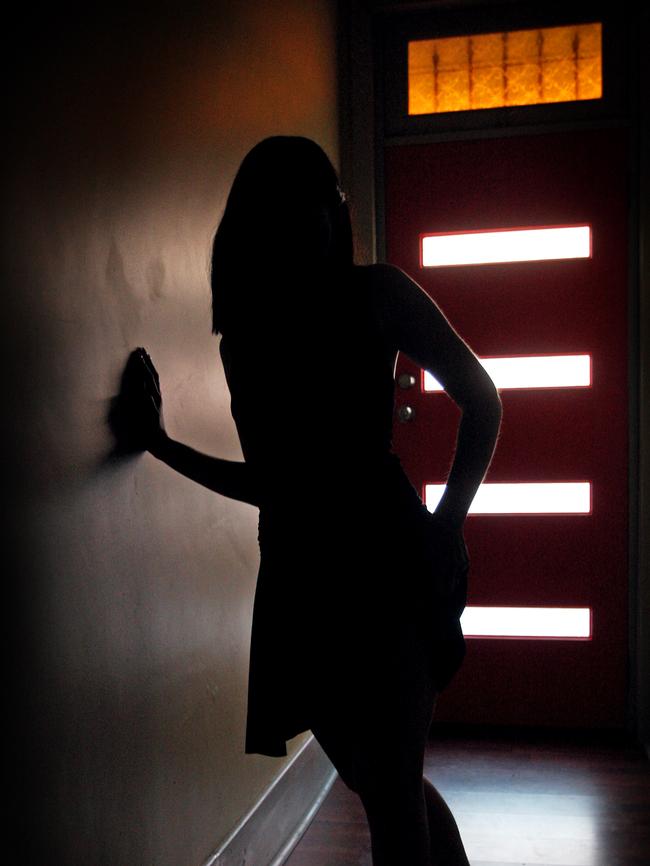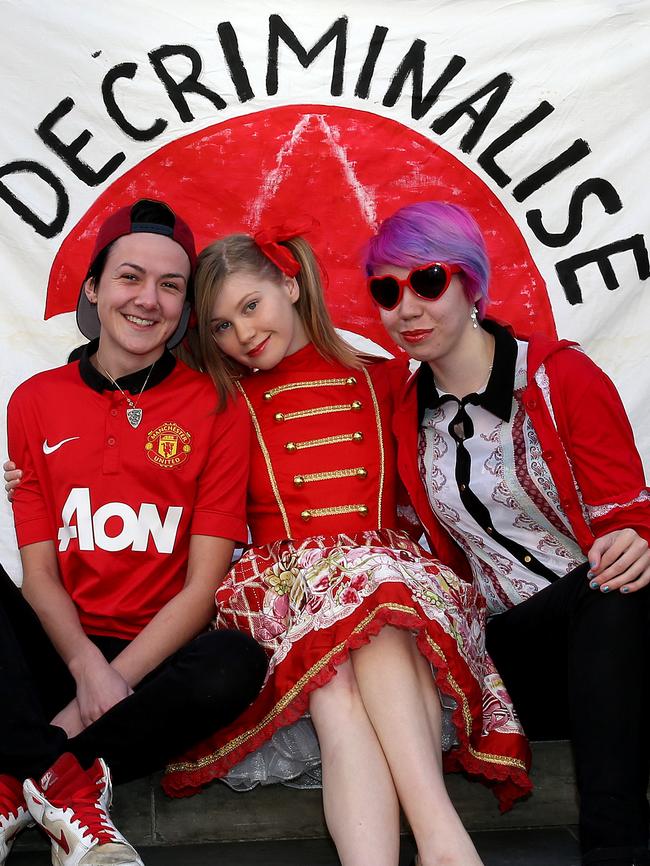Sex work in South Australia — should it be decriminalised?
SEX work is illegal in SA but that doesn’t stop more than 2000 sex workers operating in secret. Now another bid is being made to decriminalise the world’s oldest profession.
IT’S 11.15am. Alexandra Black’s phone buzzes. “I’m out front,” a message on her screen reads. She texts back her hotel room number.
Minutes later there’s a knock at the door. Alexandra, not her real name, looks through the peephole and a man in his 30s or 40s, dressed in a business suit, is standing there. She lets him in.
It’s not the sex worker’s first client of the week and won’t be the last.
Five to 10 clients a week. On average $400 each. Most of her clients are business types or university students.
On a bad week Alexandra, who has been a sex worker for seven months, relies on her savings. Sex with strangers doesn’t bother her, because the money supports the lifestyle she wants.
But money isn’t her concern, rather that the next client could turn violent.
“I’m afraid every day I go to work,” she says.
Once a client forcibly held her down, a hand around her throat. Through gasps she managed to yell for hotel security until the man fled in panic.
“I’ve had things stolen but I’ve never reported these incidents to the police,” she says. “I’m too afraid to out myself.”
A cross-party group of three Upper House women — led by the Liberals’ Michelle Lensink — has introduced legislation to Parliament in the latest bid to decriminalise sex work, saying it will improve the state’s 2000 sex workers’ health and safety.
Previous attempts to decriminalise the sex industry have failed, including a Bill by Labor MP Steph Key last May which did not progress because of the prorogation of Parliament.
Ms Key has spearheaded three failed attempts to reform sex work laws and Labor has been trying to pass legislation to decriminalise the industry since as early as the 1970s. Ms Lensink hopes going through the Upper House committee will give the Bill the discussion it needs.

Another Adelaide sex worker told the Sunday Mail she had faced murder and extortion threats when she was stripping in front of clients but says police were no help when she reported the matters.
“There’s been one incident where I was certain I wouldn’t get out alive ... because of that incident I no longer visit clients’ homes,” says the 24-year-old, who asked to remain anonymous. “There has been others where I’ve just been assaulted or raped.”
When she reported a murder threat from a former client, an officer told her the job “attracts those kinds of people”.
“I quickly learned that the cops don’t care about sex workers of any kind, and that they can’t be trusted,” she says.
“Bad clients know ... reporting incidents would mean we’d have to out ourselves in a society where we’re criminalised.”
SA Police are unable to comment directly on the murder threat but a spokesperson says all crimes are taken seriously, including violence against sex workers, and police would not hesitate to take action.
While Sex Industry Network manager Sharon Jennings says no client had hurt her in her 10 years of working as a sex worker, she would have thought twice about reporting a crime in her former work because police had data about who she was.
She said sex workers had a well-grounded fear of police knowing where they work and would later arrest them.
“I know that although I’ve never been prosecuted for my job, that there is data that police hold that says I’m a sex worker,” she says.
“As sex workers, we often hear discriminatory statements such as ‘What
do you expect when you are a sex worker’. What we expect is to be treated as equals and to have fair access to justice, and this is simply not the case under the present laws.”
Ms Jennings says the Bill will decriminalise the industry without putting restrictions on what sex workers can or can’t do.
Opponents of the Bill, including Family First’s Robert Brokenshire, says the proposed legislation does little to help sex workers and legalising the sex industry will encourage drug dealing and sex slavery.
“A lot of brothels have other activities such as illicit drugs ... so the clientele goes there for more than just sex,” he says.
“Legalising it would mean the people running those brothels would bring younger women from overseas.”

Ms Lensink says there is no evidence suggesting crime or sex work will increase if it is legalised.
“(The crime of) sexual servitude and trafficking is not removed from the law,” she says.
Ms Jennings says reports from SIN’s peer network show sex work has no link to organised crime, sex trafficking or pimping in Adelaide. “It’s a racist statement to me to say if you come from Asia and you’re doing sex work, you must be trafficking, (that) this can’t be your choice,” she says.
“How dare people say that Asian sex workers haven’t got agency and can’t make those decisions themselves. It’s quite disgusting.”
Ms Jennings says she has never met anyone who has been forced into the job.
“There is a deep-seated morality around sex work. There are a lot of people (this job) wouldn’t suit and they often say why would anybody choose that?” she says.
“It’s flexible around family, studies ... if you have chronic illness and you can’t hold down a 9-to-5 job, sex work will really fit with that because you can work when you’re feeling good and take time (off) when you’re not.”
Another Adelaide sex worker, an honours student and mother of a young girl, says the job meant financial freedom for her and her daughter.
“No one dreams of their kids being a cleaner or in a shitty bar job, but no one criminalises these jobs,” she says.
“If she (my daughter) is in a position to choose to do this, I want her to be able to do it safely and legally.”
Renee, 22, has a family member moonlighting as a sex worker and says it was hard coming to terms with at first.
“When I first found out (about the relative) I was a young teenager. I did not want to tell anyone — I was ashamed,” she says.
“Growing up I learned it’s (their) body, it’s (their) choice ... shouldn’t judge what people do with their bodies.”
Despite the fact sex workers still face discrimination in a criminalised environment, many — like Ms Jennings — still take pride in what they do.
“There’s a great deal of skill sets involved. It’s not just a case of lying down and thinking about Australia,” she says.
“It requires a lot of skills that gets overlooked — negotiation, advertising, plus knowledge on human anatomy, counselling sexual response.”
She says there are people who are isolated and need human contact.
“They want to be held and touched, and particularly people with disabilities, (who) have been touched, prodded and poked on a regular basis but never in a caring way, it’s just clinical,” she says.
“And we can provide so much with compassion.”
Submissions to the Bill officially closed on Friday, October 16, but the parliamentary committee will still accept submissions before it reports back to the Upper House by early 2016.
